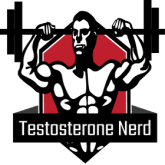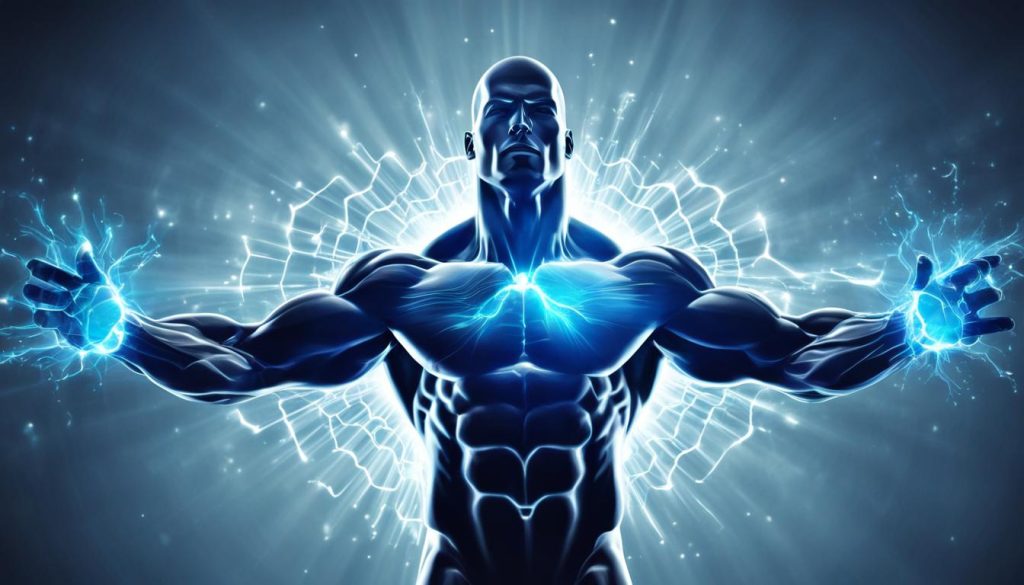As a health-conscious individual, I understand the importance of maintaining optimal energy levels, a healthy libido, and sharp mental acuity. Did you know that testosterone plays a crucial role in all of these aspects? Yes, testosterone, the hormone often associated with male characteristics, has far-reaching effects on our overall well-being.
Studies have shown that testosterone not only influences our physical development but also affects our brain and cognitive abilities. In this article, we will explore how testosterone levels can directly impact our energy, libido, and mental sharpness.
Key Takeaways:
- Testosterone is a hormone that impacts energy levels, libido, and mental sharpness.
- Low testosterone levels can lead to decreased energy, reduced libido, and impaired cognitive function.
- Testosterone replacement therapy can help improve energy, libido, and cognitive abilities in individuals with testosterone deficiency.
- Consulting with a healthcare professional is crucial to determine the most appropriate course of action and address any underlying issues.
- Maintaining healthy testosterone levels is vital for overall well-being and vitality.
The Role of Testosterone in Cognitive Function
Testosterone plays a crucial role in cognitive function, including memory, spatial abilities, and verbal abilities. Research has shown that low testosterone levels can contribute to cognitive impairment, leading to difficulties with memory and concentration.
On the other hand, testosterone replacement therapy has been proven to improve cognitive function in individuals with testosterone deficiency. This therapy can help enhance mental sharpness, improve memory retention, and increase overall cognitive performance.
However, the exact mechanisms through which testosterone affects cognitive function are still not fully understood and require further research. Scientists are actively investigating the relationship between testosterone levels and mental sharpness to gain a deeper understanding of this complex interaction.
“Testosterone plays a crucial role in maintaining optimal cognitive function, including memory, spatial abilities, and verbal abilities.”
By studying the effects of testosterone on mental sharpness, researchers can shed light on potential interventions and treatments for individuals experiencing cognitive decline or impairment.
Testosterone and Memory
Several studies have explored the impact of testosterone on memory function. Research conducted at the University of Southern California found that higher testosterone levels were associated with better spatial and episodic memory in older men. These findings suggest that maintaining healthy testosterone levels may help preserve memory function as individuals age.
Testosterone and Verbal Abilities
In addition to memory, testosterone also plays a role in verbal abilities. A study published in the Archives of Sexual Behavior indicates that higher testosterone levels are associated with enhanced verbal fluency and word recall. These findings emphasize the influence of testosterone on various aspects of cognitive function, including language and communication skills.
Testosterone Replacement Therapy and Cognitive Improvement
Testosterone replacement therapy has shown promising results in improving cognitive function among individuals with testosterone deficiency. A systematic review and meta-analysis published in JAMA Psychiatry concluded that testosterone treatment led to better verbal learning and memory, attention, and executive function in these individuals.
While the exact mechanisms of action are still being investigated, it is believed that testosterone supplementation enhances the connectivity between brain regions involved in cognitive function. This improvement in brain connectivity may contribute to the observed cognitive benefits in individuals undergoing testosterone replacement therapy.
| Testosterone Levels | Mental Sharpness |
|---|---|
| Low | Associated with cognitive impairments, difficulties with memory and concentration |
| Improved through testosterone replacement therapy | Shown to improve cognitive function, enhance memory retention, and increase overall mental sharpness |
As our understanding of the relationship between testosterone and cognitive function grows, it becomes increasingly clear that maintaining healthy testosterone levels is essential for optimal mental sharpness and cognitive performance.
Testosterone and Libido
Testosterone is closely linked to libido, which refers to one’s sexual desire and drive. Research has shown that testosterone plays a crucial role in maintaining a healthy libido in both men and women. When testosterone levels are optimal, individuals often experience a strong and consistent sex drive, leading to a fulfilling sexual life.
However, when testosterone levels are low, it can negatively impact one’s libido. Low testosterone levels can result in a decreased sex drive, making it challenging to feel sexually aroused or interested in sexual activities. Additionally, individuals with low testosterone may also experience sexual dysfunction, such as difficulties with erectile function or orgasm.
Fortunately, testosterone replacement therapy has been proven effective in improving libido in individuals with testosterone deficiency. By restoring testosterone levels to a normal range, this therapy can help enhance sexual desire and function.
It’s important to note that while testosterone plays a significant role in libido, other factors can also influence it. Psychological factors, such as stress, anxiety, depression, or relationship issues, may contribute to changes in libido. Therefore, a comprehensive approach to addressing and managing libido concerns should involve consulting with a healthcare professional to determine the most appropriate course of action.
The Effects of Testosterone on Libido
“Testosterone is a key hormone involved in regulating sexual desire. Maintaining optimal testosterone levels is essential for a healthy sex drive.”
In summary, testosterone plays a crucial role in maintaining a healthy libido. When testosterone levels are low, it can lead to a decreased sex drive and sexual dysfunction. Fortunately, testosterone replacement therapy can help improve libido in individuals with testosterone deficiency. However, it’s essential to consider other factors that may influence libido and consult with a healthcare professional for personalized guidance.

Testosterone and Energy Levels
When it comes to energy levels, testosterone plays a crucial role. Research suggests a strong connection between low testosterone levels and decreased energy, fatigue, and reduced physical strength. As testosterone levels decline, many individuals may experience a noticeable decrease in their overall energy levels and find themselves struggling to keep up with daily demands.
Testosterone replacement therapy has emerged as an effective solution for addressing low energy levels associated with testosterone deficiency. Studies have shown that this therapy can significantly increase energy levels and improve physical strength in individuals with low testosterone.
However, it is important to recognize that low energy levels can arise from various factors, including lifestyle choices, diet, and exercise habits. While optimizing testosterone levels can undoubtedly have a positive impact on energy, a comprehensive approach that addresses all contributing factors is necessary to effectively manage energy levels.
One must also consider the interplay between testosterone and other hormones and their effects on energy regulation. For example, cortisol, also known as the stress hormone, can influence energy levels and counteract the positive effects of testosterone. A holistic approach that promotes hormone balance and overall well-being is crucial for sustaining optimal energy levels.
So, if low energy levels are affecting your quality of life, it may be worth exploring testosterone replacement therapy as a potential solution. Remember to consult with a healthcare professional to determine the most appropriate course of action and to address any underlying issues that may be contributing to your low energy levels.

“Optimizing testosterone levels can significantly improve energy levels and physical strength, but it is important to address all contributing factors for long-lasting results.”
Conclusion
Testosterone plays a vital role in our overall well-being, impacting energy levels, libido, and mental sharpness. Research has demonstrated that individuals with low testosterone levels may experience decreased energy, reduced libido, and impaired cognitive function.
Fortunately, testosterone replacement therapy has been shown to effectively address these issues in individuals with testosterone deficiency. However, it is crucial to consult with a healthcare professional to determine the most appropriate course of action and to address any underlying factors that may be contributing to these symptoms.
Maintaining healthy testosterone levels is essential for optimizing energy levels, revitalizing libido, and enhancing mental acuity. Therefore, it is recommended that individuals experiencing symptoms associated with low testosterone seek medical advice to explore potential treatment options and promote overall vitality.
References:
- https://prioritymensmedical.com/blog/memory-loss-brain-fog-effects-of-testosterone-on-brain/
- https://www.ncbi.nlm.nih.gov/pmc/articles/PMC5209560/
- https://www.ncbi.nlm.nih.gov/pmc/articles/PMC4330791/
I've been fascinated by natural male hormone optimization since 2016. And ever since I've been going through boatloads of different meta-analyses and scientific data associated with increasing testosterone levels naturally. I hold a PhD degree in public health and have 10+ scientific publications on Google Scholar. Thus, in my collective work here you'll find helpful tricks, natural remedies, detailed product reviews (including stuff I've personally tried)... and more!



